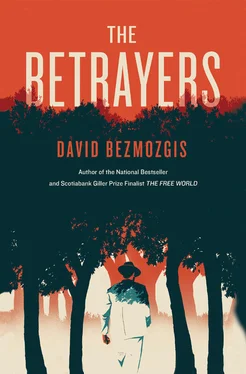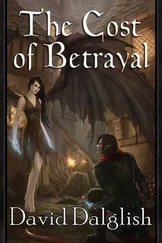Svetlana had said paranoia, but that was not the right word. It was not paranoid for him to believe that a man such as the one she had described, a Jew of that generation, native to Moscow or Leningrad, part of the intelligentsia, might be able to recognize him. That was no paranoia. That was a fact. A fact that had dictated the course of his life for the past four decades. It had dictated where he could live and whom he could associate with. For those four decades he had taken every precaution to avoid meeting people like the man Svetlana had now recklessly brought into their midst. This was something she knew as well as he. It was the very reason they had met: she had lived in a part of the Soviet Union, the sort of provincial hinterland, where no Jew from Moscow or Leningrad had set foot since collectivization. This was where he had been deposited by the KGB and where he had remained, a Jewish needle in the Soviet haystack, until everything changed and it seemed possible and permissible to venture out. But he and Svetlana had still been guided by the same fact. By then, Yalta seemed as safe as their little Ukrainian hamlet, which was dying a sclerotic death. By then, in Yalta, after the flood of emigration, one was as likely to encounter a Jew from Moscow or Leningrad — now St. Petersburg — as in any rotting kolkhoz. So how was it that something they had registered as a fact, a reality, a peril, something that had accounted for nearly forty years of their lives — how could Svetlana now deride this as paranoia? But after nearly forty years, was the peril the same? Time made specters of perils. But was this true of every peril? And how much time? And who could claim the authority to decide? Who could say to another that his fears were unsubstantiated? That the wolf was not at the door? That the wolf was not even a wolf? And who knew this better than a Jew? Still, he was willing to concede that time had done its work, that time, like water, had eroded the sharpest edges from the peril. What he had feared before — confrontation, outcry, retribution — he did not fear in the same way. Not from a random Russian Jew, even, say, a former activist who might be able to recognize him. Nina Semonovna had spoken of attacks in the press, of newspaper articles, of public excoriation, but he didn’t believe that a chance encounter would have the same consequences. And if not those, then what consequences? What was it that he still desperately wished to avoid? Curses? Epithets? Or just that penetrating look of contempt? The tangible evidence that there remained people in the world for whom he was unredeemed, unredeemable.
But had he even this much to fear from the man Svetlana described? This midget with a mistress? What feelings to attribute to this sort of man? No, it was not a case of paranoia that was at issue but a case of overreaction. He and Svetlana both. They were equally at fault. They had each attributed too much to this man. Svetlana had been too hopeful; he too fearful. Hers the exaggerated hope that this man could save them; his the exaggerated fear that this man could harm them.
Back in the house, he sequestered himself in his armchair and watched the insipid programming from Channel One in Moscow. A game show hosted by a facetious impresario. A benevolent vozhd who behaved toward the contestants — bumpkins and workers — as if they’d come to touch the hem of his Italian suit. This was what they had raised from the scraps of communism. This was what the struggle for freedom and democracy had delivered. Bread and circuses. Mostly circuses. From one grand deception to another was their lot. First the Soviet sham, then the capitalist. For the ordinary citizen, these were just two different varieties of poison. The current variety served in a nicer bottle.
As Tankilevich allowed the vulgarity to wash over him, Svetlana sat on the sofa with one of the free weekly newspapers on her lap. Occasionally he would hear her rustle a page or sense that she had raised her eyes to glance at the television. Finally she folded her newspaper and stood up. She was almost through the door before she stopped and let out what she had pent up.
— It’s not you alone who prays. I also pray. And it may be that God has sent these people to us.
Tankilevich did not even grumble a response but waited for her to leave the room. The game show came to an end and the nightly newscast began. The game show was offensive, but there were no words for the newscast. Every lie starched and ironed. The pomp of a new agreement between Russia and Western corporations to drill for oil in the North Pole. Which everyone knew meant billions of dollars to the same crooks. Condemnation of America for interfering in the affairs of sovereign states. Which meant defending the rights of Arab dictators to shoot their citizens with Russian guns. A clash between authorities and violent demonstrators in Moscow. Which meant the criminal regime stifling dissent. This was Moscow, Russia, and he was in Yalta, Ukraine. But it mattered little. Moscow, Kiev, or Minsk. The same methods prevailed.
Tankilevich turned off the television and rose heavily to his feet. He was overcome by fatigue. The fatigue of living in this country. The fatigue of enduring a day of such indignities — after a life of such indignities. He took a few steps and then caught his haggard reflection in the window. There had been a time when women considered him handsome and he had prided himself on his looks. Now he was like an old elephant, a big gray beast sagging to the earth. He ran his hand through his hair and cleared his throat. More quaveringly than he intended, he called to Svetlana.
— Mother, if you’re not praying, make some tea.
At dawn Kotler opened his eyes. He had been lying in bed for what seemed like hours with his eyes shut, thinking, thinking. For part of this time, he had heard Leora shifting beside him. Then she had grown still, her breathing become that of a sleeping person. He wished to sleep too, but his mind was too active. For a man of his vocation — civic life, politics — sleepless nights should not have been uncommon. Indeed, for months now he had been embroiled in a political struggle and a love affair, but he could not say that he had lost an entire night’s sleep. An hour here or there, certainly, but not a full night watching the chromatic spool in his head. In fact, part of what kept him awake were recollections of sleepless nights past. The sleepless nights after Tankilevich’s article ran in Izvestia. That article had marked the beginning of his third life. First life: rank-and-file Soviet citizen. Second life: rank-and-file dissident. Third life: the chosen among the chosen. Many sleepless nights followed: sleepless nights waiting for the knock on the door; sleepless nights in his cell in Lefortovo, parsing his interrogator’s every word and gesture, trying to squirm his way out of the psychological maze; sleepless nights during his trial, chiseling away at the lies of his accusers; sleepless nights in solitary confinement, in conditions too brutish for sleep; and sleepless nights in the camps before a hunger strike, steeling himself for the ordeal, incanting a Hebrew phrase he had memorized, the words ringing like hammer blows: Justice, justice, shall you pursue.
And now what was he pursuing? Kotler asked himself. Justice, justice, he playfully replied.
He swung his legs around and rose from the bed. He pulled on his trousers and his shirt. Barefoot, he padded to the window. The chickens were out, pecking. Ma nishma, chickens? he greeted them. Joviality in the face of adversity, that was the secret of his success. And of my undoing! he appended to himself jovially.
Behind him, Leora stirred. He turned from the window. This was how they had spent their first, and possibly last, night alone together. Lying silently in the same bed, thinking their separate, divergent thoughts. Very like a married couple. Another of life’s scintillating ironies.
Читать дальше












